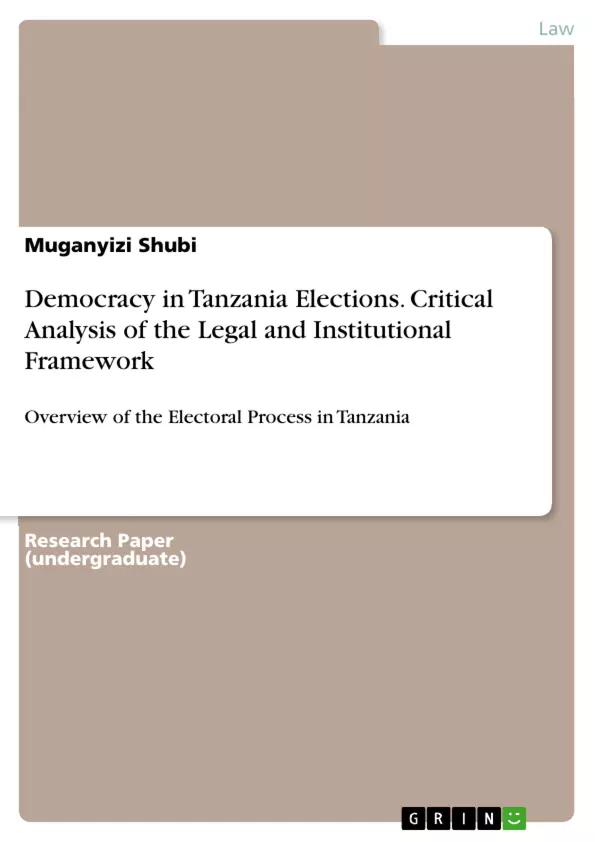Most aspects of human life are dependent on the political make up of the state and
the contemporary world has put into priority democratic forms of government as it
allows the followers to have a dictative power to determine who to rule over them
and under which standards the leader should conduct his reign. For that porpose
democratic elections were introduced in The United Republic of Tanzania.
For the purpose of ensuring democratic elections, laws are enacted and put into force
both at the municipal and international levels. Also, electoral management bodies are
established by the laws to execute the purpose in all democratic elections. In
Tanzania two bodies act for the purpose as establised by the Constitutions inforce
therein. The bodies are the National Electoral and Zanzibar Electoral Commissions
(NEC and ZEC). The core principle governing the powers and operations of these
commissions are independence and impartiality and the elections executed in
complience with the principles are deemed free and fair (just), this is tested by the
electoral stakeholders through their post electoral views and commentaries.
Generally, the study is about the independence and impartiality of the commissions
as to secure confidence of the public in their dealings so as to realise democratic
elections in the state.
The study is made up of five chapters as follows: Chapter one covers the background
information, research problem, research objectives, and research methodology.
Chapter two explains the conceptual framework covering the operational meanings
of key words concepts and the perspectives of various levels of the universe on
democratic elections. Chapter three provides the legal and institutional frameworks,
while Chapter four dwells on analysis and presentation of findings of the study. The
last chapter provides the conclusion and proposes recommendations to curb the
researched problem.
Table of Contents
- Chapter 1: Introduction
- Chapter 2: Literature Review
- Chapter 3: Research Methodology
- Chapter 4: Data Analysis and Findings
- Chapter 5: Conclusion
Objectives and Key Themes
This research paper aims to critically analyze the legal and institutional framework governing democracy in Tanzanian elections. The study seeks to identify strengths and weaknesses within the existing system and potentially suggest areas for improvement.
- Legal Framework for Elections in Tanzania
- Institutional Mechanisms for Ensuring Free and Fair Elections
- Challenges to Democratic Elections in Tanzania
- Comparative Analysis with Other Electoral Systems
- Recommendations for Strengthening Electoral Democracy
Chapter Summaries
Chapter 1: Introduction: This chapter introduces the topic of democracy in Tanzanian elections, outlining the research problem and its significance. It establishes the scope and objectives of the study, highlighting the importance of analyzing the legal and institutional framework to promote free and fair elections. The introduction likely provides background information on Tanzania's political system and electoral history, setting the stage for the subsequent chapters' in-depth analysis.
Chapter 2: Literature Review: This chapter presents a critical review of existing literature on Tanzanian elections and democratic processes. It likely synthesizes scholarly works, reports, and other relevant documents to provide a comprehensive understanding of the subject. The literature review will contextualize the research by analyzing previous studies on election-related issues in Tanzania, identifying gaps in knowledge, and justifying the chosen research methods.
Chapter 3: Research Methodology: This chapter details the research design and methods employed in the study. It likely explains the approach taken, the data collection techniques used, and the analytical framework applied to the collected data. This section will justify the chosen methodology, outlining its strengths and limitations in relation to the research objectives.
Chapter 4: Data Analysis and Findings: This chapter presents the findings of the research, based on the data collected and analyzed. It likely includes statistical data, qualitative observations, and insights obtained from various sources. The chapter will present and interpret the data in a structured manner, highlighting patterns and trends that support or refute the research hypotheses.
Keywords
Tanzanian elections, electoral democracy, legal framework, institutional mechanisms, free and fair elections, political participation, election administration, electoral reforms, challenges to democracy, comparative electoral systems.
Frequently Asked Questions: Comprehensive Language Preview of Tanzanian Elections
What is the subject of this research paper?
This research paper critically analyzes the legal and institutional framework governing democracy in Tanzanian elections. It aims to identify strengths and weaknesses in the system and suggest potential improvements.
What are the key themes explored in the paper?
Key themes include the legal framework for elections in Tanzania, institutional mechanisms for ensuring free and fair elections, challenges to democratic elections, a comparative analysis with other electoral systems, and recommendations for strengthening electoral democracy.
What does the Table of Contents include?
The Table of Contents covers an introduction, a literature review, the research methodology, data analysis and findings, and a conclusion.
What is the purpose of Chapter 1 (Introduction)?
Chapter 1 introduces the topic, outlines the research problem and its significance, establishes the scope and objectives of the study, and provides background information on Tanzania's political system and electoral history.
What is the focus of Chapter 2 (Literature Review)?
Chapter 2 presents a critical review of existing literature on Tanzanian elections and democratic processes, synthesizing scholarly works and reports to provide a comprehensive understanding of the subject and contextualize the research.
What information is presented in Chapter 3 (Research Methodology)?
Chapter 3 details the research design and methods, explaining the approach, data collection techniques, and analytical framework used, and justifying the chosen methodology.
What does Chapter 4 (Data Analysis and Findings) contain?
Chapter 4 presents the research findings, including statistical data, qualitative observations, and insights, interpreting the data to highlight patterns and trends.
What are the key words associated with this research?
Key words include Tanzanian elections, electoral democracy, legal framework, institutional mechanisms, free and fair elections, political participation, election administration, electoral reforms, challenges to democracy, and comparative electoral systems.
- Citar trabajo
- Muganyizi Shubi (Autor), 2017, Democracy in Tanzania Elections. Critical Analysis of the Legal and Institutional Framework, Múnich, GRIN Verlag, https://www.grin.com/document/491860



